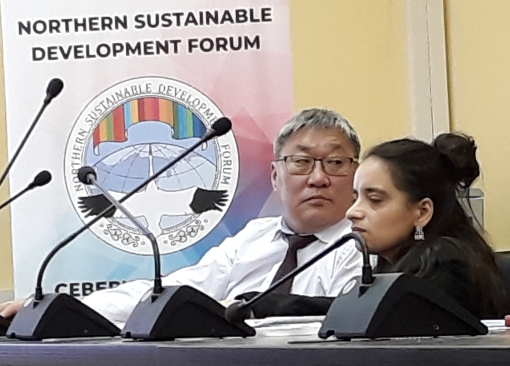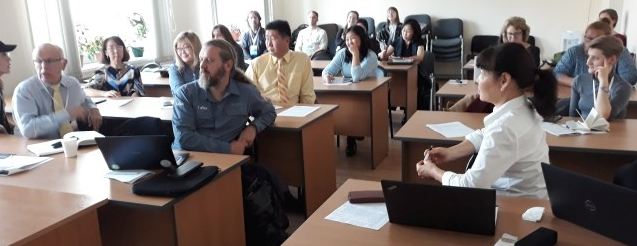These were the introductory words of Alexandr Ivanov, the head of the Olenek district in Yakutia, in his discussion during our session on indigenous people’s territorial governance under industrial development at the Northern Forum for sustainable development in Yakutsk, 25 – 26 September 2019 (full session programme).

He thought it is useful to remind researchers from any field and country that there is a tendency in scholarship to portray indigenous life in the Russian Arctic as a struggle for survival, rather than a quest for harnessing opportunities, achieve well-being and happiness, and just living at home. This stems from the old idea that the Arctic is a resource frontier with a tough climate rather than home for people. Social scientists doing Arctic Studies have acknowledged this long ago, and published on it before.
The session introduced the international and regional communities from both research and practice with the outcomes of two research projects on the topic, funded by the Norwegian Research Council, and by the Canadian SSHRC, with guests by the Canadian government, scholars from all over the world and also regional political leaders.
Gunhild Hoogenson-Gjorv in her introductory speech suggested the concept of human security as providing a lens to understand relationships of territorial governance of indigenous peoples under industrial development.

This is a good occasion for taking the security concept out of state dominance, looking specifically at civilian agency for understanding how people perceive their own security. Moreover, a focus was also on the extent and way in which the regional government, (here of the Republic of Sakha Yakutia) manages to represent these perceptions of security of local people. A good example is the changes that the Sakha Republican government advocated in the Russian Federal Law on the Far Eastern Hectare. Our team has written an article about this. The main instrument that the Sakha government used for preventing their indigenous territories being given away to incoming migrants was registering them as territories of traditional nature use.
Ivanov, head of the Olenek municipality in North Yakutia presented the situation in his area with another beautiful statement:

“the industry is our evil, but we need to turn it into a benefit”. Big industry came to his area 5 years ago, and their municipality reacted by registering all the land as Territories of traditional nature use. This status implies for companies with a licence to extract the duty to consult and conduct both the environmental and so called ethnological impact review (ethnologicheskaia expertisa). In the public hearings and consultations the local people have the possibility to comment and reject the statements of the expert reviews. Currently the municipality has four big framework agreements with the mayor companies working in the area, mostly from diamond extraction, as the Yakutsk minister for industry Maksim Tereshenko added.
Many of the presentations focused on the situation in the South Yakutian boreal forest, the Neryungryi, Aldan and Olekminsk districts. The commonality among all was that reindeer herders and hunters compete with other land users over access to the land, which they use as on-surface resource (pastures, hunting, fishing grounds). Antonina Savvinova’s and Vikroriya Filoppova’s presentations outlined with beautiful maps and useful background members the situation on paper, of how indigenous obshiny (communities) have secured documentations on their land. Donatas Brandisauskas, Aytalina Ivanova and Florian Stammler’s presentations zoomed in on particular cases showing the lived experience of negotiating access to land between indigenous herders and hunters and the industry (Ivanova & Stammler) and a national park administration (Brandisauskas) respectively. These detailed cases showed that besides the official picture that you get in interviews in villages, there is a great diversity of informal and unwritten agreements, or undercover agency how people use their land regardless of what their land titles allow or forbid. After all, the indigenous people have lived there for much longer than the laws exist.

The discussion of Ivanova’s and Stammler’s paper highlighted the broader relevance of their conclusions: we showed how the state withdraws from the land in contemporary Russian reindeer herding territories, that the state’s hand reached out to the taiga in the Soviet Union, but that the hands of the Russian state do not reach beyond the village any more, where people received subsidies and welfare benefits. Instead, where present, companies may fill the gap left behind by the state and provide services to local people. Maria Gunko, geographer from the Russian Academy of Sciences, commented that the same tendency can be observed also in industrial cities, where the state withdraws and leaves the field to voluntary action by industry. Piers Vitebsky (needless to introduce him here:)), broadened this further and suggested that the withdrawal of the state is a global tendency. Just look at the UK and the US, he said. There, the state is very present when it comes to facilitating profit-making by big industry, but withdraws from the social sphere.
Joseph DiMento from the University of California Irvine in his presentation on international law of environmental governance highlighted the concept of ecosystem-based management as one with great potential. He says that the concept includes the participation of local people in the management of the ecosystem, as well as the equal consideration of traditional knowledge. This would open an avenue for more participation of local people in the decision making of what happens with their land. Matrena Okorokova from NEFU also focused on the aspect of participation in her study on how youth participation is envisioned in development strategies of these two industrial districts Neryungryi and Aldan in South Yakutia.
The concluding discussion showed that besides human security, participation was a topic that went through all the presentations in the session. Everybody seemed to agree that people’s participation in governing their lands is one crucial determinant of sustainable development in the Arctic. Rather than arguing that survival is the only worry of people in the Arctic, the papers and discussion showed that – officially or not – people take part in territorial governance in any case. They are not only victims of alien decisions, and they do much more than just making ends meet. They live there and harness opportunities!
